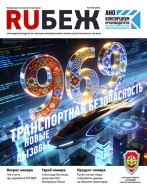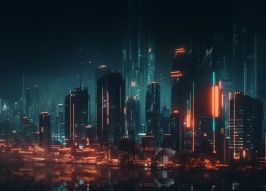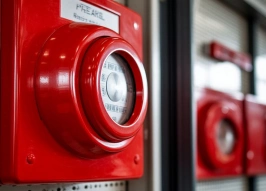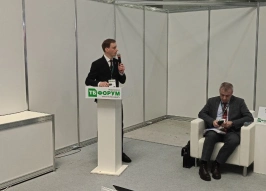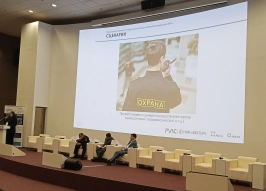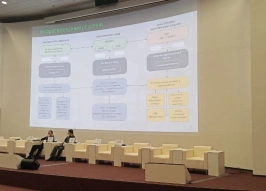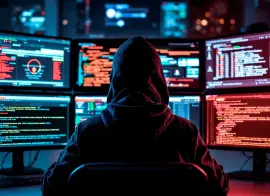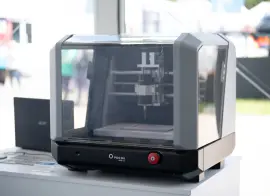What’s next? How will import substitution affect your business?
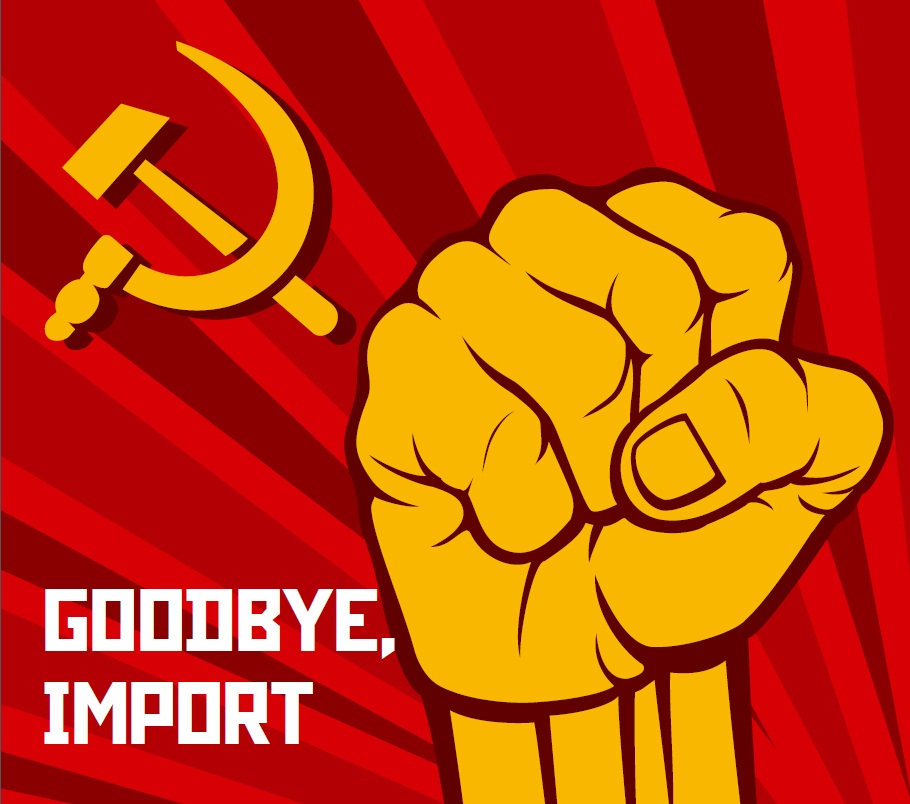 According to the plans of the Ministry of Industry and Trade, the share of foreign products in the total volume of procurement should not exceed 20% by 2017. RUBEZH magazine interviewed security systems market players and asked their opinion on the prospects of a possible reduction in demand for the products of foreign manufacturers and suppliers.
According to the plans of the Ministry of Industry and Trade, the share of foreign products in the total volume of procurement should not exceed 20% by 2017. RUBEZH magazine interviewed security systems market players and asked their opinion on the prospects of a possible reduction in demand for the products of foreign manufacturers and suppliers.
Vladislav Polovnikov
CEO, LLC “IRSET-Center”
On the one hand, we are a company with full cycle of production, therefore we can minimize the risks associated with foreign supply. On the other hand, there is an issue concerning electronic components that not available today in Russia – alternatively we can purchase these components in Southeast Asia. Any sanctions governing the supply of imported electronic components will bring difficulties to all manufacturers of security systems or fire alarm devices.
Will our company be able to abandon imports and switch to Russian alternatives? If we speak about equipment and materials of full production cycle, then this will not a problem for us. But if we talk about components, then this will come as a serious blow. There are no manufacturers of this kind in Russia, and it is unlikely that this manufacturing sector can be created quickly from scratch.
Leo Meliksetyan
chief warning systems sales manager, group contractor “Escort”
As the result of import substitution policy realization and the reduction in the share of imported goods procurement down to 20%, we expect to see an increase in Roxton equipment sales. Inter-M equipment, which is also distributed by our company, is made in South Korea.
The complete replacement of imports is possible for desktop and rack-mount equipment, but it is unlikely that we can replace acoustics. No one produces speakers cheaper than China.
Pavel Zubov
key clients service manager, Fujifilm
We collaborate with Russian companies that develop and produce surveillance systems. They could refuse using our lenses if Russian manufacturers offer products of similar quality and comparable price. In the foreseeable future this is science fiction.
Complete substitution of imports in the production of video surveillance equipment is impossible due to the localization of key components manufacturers in Asia.
Robert Lazarev
director of business development in Russia and CIS, Ernitec
Components for our products come from Japan and China. The assembly is mainly located in Taiwan. We have no Russian companies among our partners.
The situation with the restriction of imports for public procurement is similar to European and American sanctions against Russia: who will be more affected by these restrictions in case they are introduced? At best, Russian companies will begin to assemble their product with the use of Chinese components at home... This will obviously be more expensive than the assembly in China, and the quality level will drop. We can draw some conclusions. Just look at the situation with car manufacturing industry - BMW is the best example
Complete replacement of imports in Russia in the field of video surveillance is possible, but then the whole industry will be thrown back to the stone age - compare products for security and fire alarm systems manufactured in Russia with foreign alternatives, and the time it took Russian companies to somehow reach the acceptable level of quality. Still, all these products have foreign components inside. I think everyone remembers Soviet "Spetsavtomatika" well.
Is there an alternative to import substitution? We need to provide developers, designers and engineers with comfortable living and work conditions in Russia. In the meantime, this resource will continue to leak out of the country.
Alexander Korobkov
developments director, Macroscop
Our company develops software and manufactures Macroscop NVR devices. As of today, considering the production of video recorders, the company remains dependent on imports. Therefore, from the perspective of hardware products manufacturer, import substitution will cause damage.
It will take many years for Russian manufacturers of electronic components to reach the current level of leading global companies, and technology-oriented businesses cannot afford keep falling behind in such massive timescale.
Today, we are mainly export-oriented, and in order to maintain high competitiveness, we rely on global standards of computer hardware and software development.
Mikhail Kutsenko
advertising department director, LLC “EVS”
We support the adoption of laws restricting the purchase of imported goods by government agencies. As for the dangers of imported products, then, frankly speaking, I find it hard to believe that consumer electronics can somehow bring harm. This may be true for cell phones or other things that can transfer information. You cannot rig an analog camera, but yes - you can mess with digital cameras with processors. How can we eliminate possible dangers? Yes, we produce IP-cameras with the use of imported components, but we develop our own circuit design and firmware, so even if there ever was anything, it gets removed.
Specialization is not just a pretty word. Every company concentrates on their own product. One company cannot embrace everything – there will be too much diversification. The company will not be able to concentrate and keep perfecting its product.
Oleg Vystavkin
CEO, LLC “Research and Production Enterprise “Magnito-Kontakt”
I don’t think import substitution is a problem for our company. Sure, there is a portion of imported components in our products, but it is not critical. There are some foreign technological things that are of better quality or cheaper. But we can safely abandon some of them. For example, recently we found a Russian equivalent for components that we used to purchase in Switzerland. Our industry is not so high-tech for us to worry about it. Besides, we don’t see any active action yet – there is hardly any investment in the development of domestic production, tax privileges barely help.
Alexander Alexeev
engineering director, LLC “Specpribor”
Everything will depend on the course. If the state decides to abandon imports altogether - this will be a collapse. If the market keeps imported components and at the same time domestic alternatives of attractive price and quality are introduced, then this will be a normal period during which we will be able to adapt.
Andrei Soldatov
Marketing department director, LLC “Satro-Paladin”
Import substitution is of course a very complicated issue indeed. Any kind of serious limitations will cause major changes in the market for both producers and distributors. It is no secret that Russia has a big problem with the component base - in the scheme "price - quality - time" it is seriously inferior to providers from Southeast Asia. Therefore, even Russian vendors that have their own production will have to raise prices and reduce the quality. Moreover, the more complex the product is, the more serious the changes will be. Distributors also will have to restructure everything – there will be new agreements with foreign suppliers, as well as with Russian. Generally, this will be a serious challenge for all members of the market. Considering the client’s side, we can confidently say the cost of solutions will increase.
Fyodor Zhidomirov
engineering director, LLC “LUIS+”
We supply both domestic equipment ("Bolid", "Argus Security", "Siberian Arsenal", "Rielta", "Bastion», PERCo, Parsec, "ElSys", "ITV l AxxonSoft", DSSL, Macroscop), as well as foreign (Bosch, Schneider Electric, Panasonic, Samsung, CBC, Jedia). It is impossible to replace all imported equipment with Russian alternatives, since many products and systems cannot be produced in Russia. This is especially relevant to video surveillance systems.
What is positive about import substitution in the field of security equipment is the development of production in Russia, and we certainly welcome that. However, it is naive to expect that full import substitution could be achieved in short time.
Firstly, technical security is the civilian branch, not military, and I have not heard that any country has announced a ban on export of video surveillance, access control, or security and fire alarm systems to Russia. Therefore, the whole issue of import substitution is somewhat artificial.
Secondly, modern security systems is a product of high technology, and it will take years to self-sufficiently reach its current level from the beginning in Russia. Unfortunately, we currently lack not only serious and large-scale production base, but also the system of training for relevant engineering staff.
The only way out of this situation can only lay in close scientific, industrial and commercial cooperation with foreign specialists and companies who can offer advanced technology in the production of security systems. It can start from just the assembly, and then move on to full production base in Russia. As the result, it should come to normal joint development process of international teams of engineers and managers. This process will allow us to create innovative products suitable for use both inside Russia and in foreign counties.
Unfortunately, we currently lack not only serious and large-scale production base, but also the system of training for relevant engineering staff.
Mikhail Levchuk
deputy CEO, CJSC “Argus Security”
Our company welcomes the import substitution trend. The desire to create products on the exclusively Russian production base has always been a part of “Argus Security” policy. Experts visiting our production environment are pleasantly surprised by our robotized full cycle production line: beginning with the assembly of printed boards to the finished product.
As a manufacturer of products popular not only in Russia but also abroad (many major facilities located in Europe use our systems), we are committed to the competition in the global security systems market, that is why we choose the best technologies and components available, and, unfortunately, they are often not of Russian origin. If we imagine that the state introduces total ban on the purchase of imported components, we will lose our ability to compete with foreign manufacturers. It should be understood that import substitution is not the answer to all problems of the economy, and in order to find an actual solution, we need to find balance, so that domestic production stimulation would not lead us to the decrease in competitiveness and product quality, technological inferiority and inefficient use of resources.
Olga Kuznetsova
analysis, planning and advertising department director, PERCo
Among the advantages of import substitution, one could name state support of domestic producers, revival of domestic industry in general, albeit slow and somewhat painful. The negative side is a possible production collapse. Most likely, many enterprises will either be closed or reorganized.
The process of industry recovery itself will take many years and a lot of investment, and there will be no guarantee that Russian industry will actually revive. On the other hand, the defense industry will win without any doubt – even now, factories working for the defense industry have a lot more resources, since they managed to conserve their scientific base, and the secrecy allowed those companies to work on new developments without distractions.
The security systems market will be marked with a decline. But it will be temporary, most likely. Especially since the Russian access control systems market is one of the largest in the world.
Close cooperation with countries of Southeast Asia, especially with South Korea, Taiwan and China can come as a good alternative to import substitution. Today, these fast-evolving countries have become the production platforms for virtually every leading company of the world. Most likely, it will be impossible to completely abandon the imports, but in the light of possible sanctions and international cooperation agreements, there will be an option to accommodate production facilities in China.
As of today, Russian manufacturers are not prepared for import substitution exactly due to the fact that the country has lost entire industrial clusters; there is no production chain – beginning with raw materials to the finished product. In addition, research and heavy industries have regressed greatly. In the past 20 years, Russia has not been working on scientific and engineering developments in the field of complex electronics.
The country is facing an almost impossible task – to reduce the twenty-year technological gap with Europe and the world in general for a minimum period of time (a year – year and a half), and in the future – to draw ahead.
Alexey Vitalisov
deputy CEO, LLC “Smartec Security”
Smartec brand incorporates equipment for video surveillance systems manufactured in different countries, mainly in Southeast Asia. Primarily we are talking about Korean, Taiwanese and Japanese companies. Today, our product range includes equipment manufactured approximately by 15 different companies. We do not sell equipment made in Russia. However, we do offer software developed by Russian companies. Even theoretically, the ban on the supply of imported products will result in market collapse. This is due to the fact that nearly 95% of the product in the field of video surveillance systems is being imported. Today, there are very few alternatives to imported products in Russia. You can count on fingers the number of Russian video surveillance companies with the full production cycle. Those are the companies that produce accessories, such as housings, or other not high-tech equipment, or companies engaged in the so-called CKD (“screwdriver”) assembly. Currently, it is impossible to imagine the possibility of complete import substitution in our industry. Bans will achieve nothing – it is not by accident that electronic components come from Asia – it is very comfortable to do business there, and the cost of labor is relatively low. In order to encourage domestic full cycle production, it is necessary to develop education and training opportunities. Today there is no alternative to import substitution, or more precisely, the alternative is in the absence of import substitution. Recall the situation with the ban on the import of right-hand cars from Japan. Back then, Russian Far East had suffered the most. People did not rush to buy Russian cars, because the quality has not changed. Protectionism policy usually drives business into the shadows.
You can count on fingers the number of Russian video surveillance companies with the full production cycle.
Igor Lyand
business director, Beward
The idea of import substitution has every right to exist, and it is possible to discern a certain meaning and identify the positivity it brings. For example, the ban on imported products may motivate Russian manufacturers to develop and create their own reliable product with a rational value for money factor. Also, this process will have favorable effect on the Russian economy in general due to the priority position of domestic producers on the federal level. But we should get back to reality. The creation of microchips used in IP-cameras costs more than one billion dollars, which is beyond the powers of domestic companies and will sooner entail opening of foreign production facilities in Russia.
The ban on the supply of imported products is an illogical and inappropriate process for the modern deeply integrated international business community. If before 1991 there was a closed cycle of commodity circulation, now there is a strong connection between global markets in the economic arena. Such strong interaction makes the process of import substitution controversial.
In addition, modern Russian manufacturers are not prepared for this change due to the absence of viable alternatives for domestic production of components. As the practice shows, the "waking" of domestic enterprises producing components for IP-cameras may require a lot of money and time, which would entail a reduction in production for an indefinite amount of time. Nevertheless, Beward is ready to introduce components of domestic production into the company’s developments, as long as those components ensure their competitive quality.
Alexei Kadeyshvili
engineering director, “Vocord”
In order to successfully support Russian manufacturers and reduce imports, the country needs to develop a comprehensive program covering various aspects of business activities ranging from personnel training programs to tax and customs preferences for domestic manufacturers. This will allow our businesses and technological sphere to become self-sufficient.
Is it possible to implement complete import substitution in the field of video surveillance production? I don’t think so. And do we really need this?
Mikhail Zamorenov
CEO, LLC “Spectr Security System” (Sarmatt)
It's no secret that all Sarmatt equipment is assembled in China. Brands that are called Canadian, American, or European - all have their equipment assembled in China. Our company will not be affected by import substitution policy. Security equipment will be not manufactured in Russia, anyway. It is very disadvantageous - we have very high customs duties, high labor costs and low production standards. Therefore, all equipment assembled in Russia will clearly be more expensive than what is assembled in China. This is the first point. Second - as I understand, Russia and China have no problems now, on the contrary, there is convergence. So, I think instead of complete import substitution we will substitute that small part of equipment coming from Europe with Chinese brands. Of course, we depend on the competition with Chinese manufacturers, especially given the recent trend of Asian companies entering the Russian market directly. This can be seen in exhibitions like MIPS and “Security and Safety Technologies”. This, of course, reduces the production costs, but it also hinders further development of companies.
Sergei Levin
chief structural engineer, LLC “Sigma-IS”
Most of the electronic components for our products come from Asia, towards which there is a loyal attitude. We also work with Europe and America, but to a lesser extent. Therefore, we hope that the supply chain from Asia will not be interrupted, otherwise not a single electronic production in Russia will be able to function. We hope that the import substitution course will affect our company positively. There was a precedent in 1998 already, when following market crash everyone turned to domestic manufacturers. Back then, we experienced a very significant rise - it has helped us to develop. Therefore, all that relates to import restrictions can help. Back then, the reason was in pricing - all import became very expensive suddenly. Now, there are possible political motives. In any case, if we can get raw materials for production, import substitution has to play a positive role.
Anton Pinzhakov
operations director, research and manufacturing association “Spectron”
It is hard to answer the question on the possibility of abandoning imports, but the issue of import substitution is being discussed in our company for a long time. We are trying to move away from the Asian and European markets. A number of products produced by our company are already being made with the use of domestic components.
Import substitution policy may bring an increase in the cost of production and, consequently, an increase in pricing, since domestic components are more expensive than imported. Transition to domestic production can also affect the quality of products. At the current stage of development, our components are significantly inferior in quality to European counterparts. In addition, we simply do not produce some of the components. Take Japanese Hamamatsu flame sensors, for instance.
A number of products produced by our company are already being made with the use of domestic components.
Irina Moiseyeva
advertising and marketing projects director, LLC “UMS Rus”
We hope that the import substitution course will not affect our company, since we have direct import from Italy.
We position ourselves as a purely European manufacturer, in compliance with European standards, which are absent in Russia. For example, considering automatic gate systems there are European EN standards, which are listed in all our catalogs. Those standards are also being met in Russia, but since there are no strict rules, we often encounter the situation when vendors try to sell virtually everything – both licensed and bad quality goods. These things need to be regulated by the state; certain standards for products must be developed. Without strict rules, the market will be flooded with Chinese products of questionable quality, resulting in a negative impact on customers.
Dmitry Taranenko
business director, LLC “Altonika”
Our company will not be affected by the state’s import substitution policy. We practically do not use components from Europe and the United States. In addition, there is always India, Thailand, and China. I think we will see investments in the development of electronic components production in Russia. There will be some viable domestic alternatives.
Boris Belenkiy
deputy director of research, OJSC “Research Institute “Giricond”
We will only be happy if such program is officially implemented. We design and manufacture parts and electronic components. It is our job to provide Russian manufacturers with domestic components. In fact, our company will be implementing this program.
The reasons why many companies choose imported components over domestic alternatives can be subjective or objective. Objectively – there may be a complete absence of certain components on the Russian market. The subjective reason is cheapness. Now the bulk of components is produced by Southeast Asia. Low cost of labor and energy maintenance - all this affects the production costs. Therefore components from Southeast Asia are more accessible and widespread. Another thing is that they do not fully comply with the requirements that apply to these products.
Источник: RUБЕЖ


